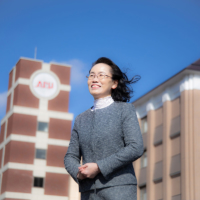The official motto of Ritsumeikan Asia Pacific University, popularly known as APU, is “Shape Your World,” an axiom that is set to take on a whole new meaning with the establishment of APU’s College of Sustainability and Tourism in April. This college will be the first in Japan to have the word “sustainability” in its name. Another unique thing about the college is how this school in Beppu, Oita Prefecture, plans to go about achieving that goal.
“Sustainability is currently offered as a science and engineering graduate course at top schools like the University of Tokyo,” APU’s Vice-President Yan Li explained. “However, to achieve sustainability, science and technology alone are not enough. APU has taken a more holistic approach to sustainability by viewing it through the lens of culture, society and economics, whereas most traditional departments focus on the tech and engineering side of it. That’s why we’ve created a humanities department that combines sustainability and tourism.”
The decision to approach the topic of sustainability in tandem with tourism was inspired by the adage “Think globally, act locally.” While the ultimate goal of sustainability studies is to apply the lessons learned to the entire world, there’s a considerable gap between that ideal and reality, necessitating a focus on individual regions and communities. That’s where the tourism comes in. Li explained: “Tourism has a lot in common with sustainability, in that it aims to discover, explore and maintain the values of a given region. In most countries, tourism means leisure, fun and relaxation. It means that in Japan as well, while also being viewed as part of the social infrastructure,” or a system that supports the quality of life in local communities.
“We start by focusing on individual areas and achieving sustainability there, and through this we might learn lessons that may one day be applied to society at large. We think that this approach of taking things region by region is a more effective and realistic way to one day achieve global sustainability,” she said. It also appears to be what’s in demand.
According to APU’s random sampling of Japanese corporations, not just in the tourism and environmental sectors, the business world is in need of experts on regional sustainability and producers who will help companies become active in local communities. Those are the kind of people that APU’s College of Sustainability and Tourism aims to produce through their nine concentrations that students can choose from and combine according to their aspirations. These are Environmental Studies, Resource Management, International Development, Tourism Studies, Tourism Industry Operations, Hospitality Operation, Social Entrepreneurship, Regional Development, and Data Science and Information System.
But APU doesn’t just talk about sustainability, it lives it. This is exemplified by a new three-story, nearly 6,500-square-meter building it just completed.
As for the new building, Li said: “It’s main part is made from wood that was sourced from a local forest and certified as environmentally friendly. It’s a space for students to build a community while enjoying the pleasant aroma of natural wood.” By mostly using lumber from Oita, the school will reduce its carbon footprint and demonstrate how regional resources can be utilized in a sustainable way. The wealth of resources in Oita Prefecture is, incidentally, another major asset of APU’s College of Sustainability and Tourism. “I think Beppu is the perfect place to learn that human development and environmentalism are not mutually exclusive,” Li said. “Beppu’s precious hot springs, for example, are both a protected tourism resource as well as an energy resource, bridging the seemingly opposing forces of progress and conservationism. We actually already have classes focused on Oita’s cultural heritage sites that encourage students to think about cultural heritage protection through the lens of tourism.” One such class took place during the 2022 fall semester when the school and Oita Bank organized an endowed lecture series called “Community Development Using Oita’s Heritage.”
The lectures and field work challenged students to consider how the tangible and intangible regional resources of Oita can be utilized for regional tourism while contributing to a sustainable community. The new college will offer more of those kinds of experiences, together with internship programs and lesson plans, to form a community of scholar-practitioners who employ academic knowledge and innovative research to solve contemporary issues and global challenges.
Sustainability is, after all, a relatively young discipline, so the generation that’s about to enter APU’s College of Sustainability and Tourism will be instrumental in developing both a sustainable future and the field of sustainability studies itself.
For more information, visit:
https://en.apu.ac.jp/home/
For application information, visit:
https://admissions.apu.ac.jp/




